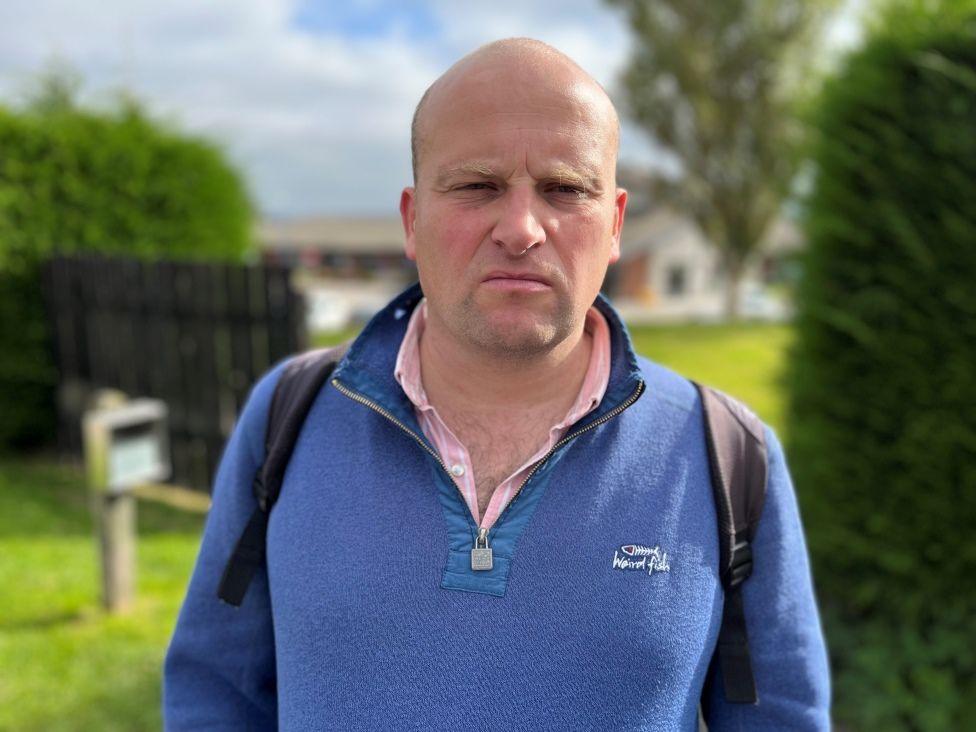Cost of temporary psychiatrists soars as doctor numbers fall

- Published
The cost of bringing in locum psychiatrists on emergency contracts to treat mental health patients in Scotland has soared, according to new figures.
The amount spent on temporary mental health doctors has risen steadily over the last five years as the number of psychiatrists in permanent NHS posts has fallen.
And the cost of those employed on emergency contracts, which are significantly more expensive, rose dramatically last year to £14.7m - almost double the figure five years ago.
The Scottish government said it was supporting health boards to reduce their reliance on locums but added the use of temporary staff in an organisation as large as the NHS would always be needed.
Campaigners claim the increasing reliance on locums can be bad for patients who can find themselves being passed between different doctors.
Some of the locum deals have allowed the temporary doctors to treat mental health patients in Scotland over video link from as far away as India.
'There simply aren't enough of us'
The Royal College of Psychiatrists (RCP) has also warned that dozens of locums in consultant posts across the country do not have the full qualifications for the role.
Some parts of Scotland are now wholly reliant on privately-supplied psychiatric doctors.
Dr Jane Morris, chairwoman of the RCP in Scotland, said the increased cost of the reliance on locums was “stark and very concerning”.
She said: “I think the whole agency locum question is a reflection of a real crisis in the Scottish psychiatric workforce.
“There simply aren't enough of us."
The number of whole-time equivalent NHS psychiatrists has dropped from 781 in March 2019 to 651 in March this year.
The reliance on locums has soared in the same period.
The total cost increased from £20.8m in 2019/20 to £34.8m last year according to figures obtained in a joint investigation by The Guardian and the BBC.
Most of the locums are supplied to boards using long-term contracts with agencies known as framework deals, where prices are agreed in advance.
But some health boards are using emergency contracts with private locum firms just to keep acute mental health services going.
Health boards were told by Scottish ministers in May last year that these emergency contracts, known as off-framework deals, should no longer be used unless there was a risk of a clinical safety breach or suspension of a service.
But last year the amount spent on them rose to £14.7m. That compares to £8.5m the previous year and £7.6m in 2019/20.
NHS Tayside is the health board which has spent the most on locum psychiatrists in the past five years.
A breakdown of its £30.4m total spend shows 84.6% of this was via the off-framework route.
Mental health services in Tayside were the subject of a critical independent review in 2020 where the use of locums was highlighted as a concern.
A spokeswoman NHS Tayside said its use of the emergency locum deals was for clinical safety reasons and reflected the nationwide shortage of psychiatric consultants.
She said: “Unfortunately, we are experiencing a high level of vacancies and this has been the case for some time. Recruitment is improving but not at the pace we need to fill the vacancies.”
Young people most likely to have poor mental health
- Published3 October 2024
Scotland's health: Mental wellbeing at record low
- Published5 December 2023
Last year an employment tribunal ruling revealed that NHS Western Isles had spent more than £1m a year employing two locum psychiatrists.
Gordon Jamieson, chief executive of NHS Western Isles, said the figures quoted for off-framework psychiatry cover were often "eyewatering".
But he said the dilemma facing his board and others was that “if you don’t respond to the market cost then you have no service".
The costs charged by private recruitment firms vary but are typically much higher than the NHS equivalent.
For example, in 2019/20 one emergency locum psychiatry contract for NHS Lothian in 2019/20 saw one firm paid £348,328 for 3,144 hours’ work – an average of £110.79 per hour.
By comparison, the locums from the on-framework suppliers cost an average of £165 an hour. The NHS internal locum bank service cost an average of £67.60 per hour.
‘They asked me the same questions again and again’
The eight-hour round trip from his home in Thurso to Inverness for psychiatric treatment is a journey that never gets any easier for Peter Todd, but it remains a lifeline for the health campaigner.
A survivor of childhood sexual abuse, Peter saw six different locum psychiatrists in the space of five years before being assigned a permanent NHS psychiatrist last year.
He says having to restate his experiences to different locums amplified his trauma.
“They asked me the same questions again and again, whereas if they had read the medical file they wouldn’t need to," he said.
“I said to one psychiatrist, 'why don’t I just bring a tape recorder from my last appointment because I’m having to repeat what I’ve repeated to previous locums' - with permanents you don’t have to do that.
“Now when I sit down with my psychiatrist I don’t need to explain why I have been referred. It’s like a weight off your shoulders.”

Peter Todd says the increased use of locum psychiatrists is costing the NHS "an absolute fortune"
Peter said he was only given a permanent NHS psychiatrist after asking for a review because of a series of mistakes made with his medical records while he was under the care of locums.
In this period, one of Peter’s appointments was a video call with a psychiatrist based in Nottingham, an experience he describes as “appalling”.
BBC Scotland understands other mental health patients in the NHS Highland area have previously been seen over video call by a locum psychiatrist based in India.
Remote appointments are an accepted part of psychiatry treatment but there has been criticism that using doctors from outside of Scotland might mean they are not up to speed on local guidelines and laws.
A spokesman for NHS Highland said: “We are unable to comment on individual arrangements however we can confirm that there have been occasions where locum consultant psychiatrists, employed by an agency, have been based outwith Highland and on occasion based overseas.”
The board added this arrangement only happened when there were no consultant psychiatrists available to work in the Highlands - and the practice had now been stopped.
Specialist register
A survey by mental health advocacy group Vox indicates Peter’s experience of locums is not isolated.
It surveyed 469 people from across Scotland on their experiences of psychiatric care in the past five years.
Nearly a third of all respondents received care from all or mostly locum psychiatrists, and more than half of those respondents said they were either "dissatisfied" or "very dissatisfied" with the overall quality of care they received.
It takes 13 years to train and qualify as a consultant psychiatrist and the current shortage means some boards in Scotland are deploying people in this role who do not have the full qualifications.
The Royal College of Psychiatrists said that last year about 50 locum consultant posts across Scotland were held by individuals not on the specialist register for consultants.

Dr Jane Morris is the chairwoman of the Royal College of Psychiatrists in Scotland
The RCP's Dr Morris said: “All too often, the person that you see described as a locum consultant doesn't, in fact, have the same qualifications as substantive [permanent] consultant.
"So they may be put in post without having completed the rigorous higher training.
"That doesn't necessarily make them a bad doctor, but it means they don't have the hallmarks that public and employers have come to rely on as providing assurance that such a doctor has the necessary skills and experience."
Scottish government mental wellbeing minister Maree Todd said two groups had been set up to address recruitment and retention issues in the psychiatry sector.
She added: “While it is NHS boards' responsibility to manage their budgets effectively, the Scottish government is supporting boards to reduce their reliance on medical locum.
“Spend on locum psychiatrists are managed locally by boards, with clear expectations that off-framework agency spend should be minimised as far as possible in continuing to ensure vital service provision during times of unplanned absence, sickness and increased unforeseen activity."
The minister said the use of temporary staff in an organisation as large and complex as NHS Scotland would always be required but pointed out the locum bill is a tiny fraction of the £9bn spent on NHS staffing every year.